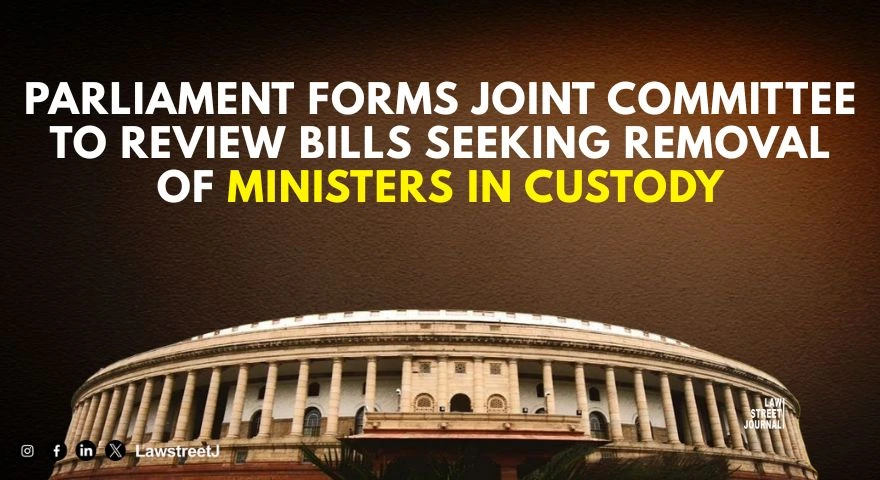New Delhi: Parliament has set up a Joint Parliamentary Committee (JPC) to review three Bills that propose removing Ministers — including the Prime Minister and Chief Ministers — if they remain in custody for 30 consecutive days on serious criminal charges. The decision has triggered a fresh constitutional debate and led several opposition parties to stay away from the panel.
The 31-member JPC, approved on November 12, will study three draft laws that seek to disqualify Ministers detained under serious criminal offences. These include the Constitution (One Hundred and Thirtieth Amendment) Bill, 2025, a Bill extending its application to Union Territories, and another amending the Jammu and Kashmir Reorganisation Act.
If passed, the laws would make detention for 30 days the threshold for disqualification — not conviction. The move is intended to ensure accountability in public office but has raised doubts about its compatibility with the Constitution and the principle of presumed innocence. The proposals intersect with Articles 75(1) and 164(1), which allow the President and Governors to appoint Ministers who hold office at their pleasure. Critics say such automatic removal may undermine executive discretion and disturb the federal structure that lets States manage their own Councils of Ministers.
Panel Composition and Boycott
The committee, headed by BJP MP Aparajita Sarangi, includes 21 Lok Sabha and 10 Rajya Sabha members. The BJP holds 15 seats, giving it a clear majority. Only a few opposition MPs have joined, among them Supriya Sule of the NCP (Sharad Pawar faction). Most INDIA bloc members — including the Congress, Trinamool Congress, DMK, Samajwadi Party, and the Left — have boycotted the committee.
They allege that the Bills are politically motivated and that the panel’s composition prevents fair discussion. Parties like the BJD, YSR Congress Party, AIMIM, and Shiromani Akali Dal have agreed to participate, revealing divisions among regional parties.
The JPC will collect expert opinions, invite legal submissions, and present a detailed report before the Bills are taken up for final debate. Parliamentary Affairs officials said the committee has also been asked to examine earlier precedents concerning disqualification of public officials facing criminal proceedings.
Legal experts have raised several concerns. The first is the presumption of innocence, central to India’s criminal justice system. Disqualifying someone based on detention, not conviction, could be seen as punitive before a verdict is reached.
The second concern involves federal autonomy. Under Articles 1 and 246, powers between the Centre and States are clearly divided. A central law mandating removal of Chief Ministers or State Ministers might interfere with State autonomy, potentially disrupting the constitutional balance.
A third question is judicial review. If passed, the Bills could be challenged in the Supreme Court or High Courts under Articles 32 and 226, focusing on due process and possible arbitrary enforcement.
Currently, Section 8 of the Representation of the People Act, 1951 disqualifies legislators only after conviction. There is no provision for removing elected or appointed officials merely for being detained. Legal commentators believe this gap will likely invite constitutional scrutiny if the Bills progress further. Another worry is the potential for political misuse — detention in ongoing cases could, in theory, be prolonged through procedural delays. Critics argue this might allow misuse against political opponents without any judicial finding of guilt.
The Law Ministry is expected to advise the JPC on constitutional safeguards, while the Attorney General of India may offer a legal opinion before the Bills proceed to the House.
Opposition’s Stand:
The opposition boycott has added a political layer to what was already a complex legal discussion. INDIA bloc leaders argue that constitutional amendments of such magnitude must be examined through a transparent, bipartisan process. They contend that the Bills, if approved in their present form, could create precedents affecting democratic principles.
Government representatives, however, maintain that the JPC provides a legitimate forum for consultation and that all parties were given an opportunity to participate. A senior official noted that the committee’s mandate includes reviewing similar provisions in other parliamentary democracies to compare standards of ministerial accountability.
The JPC’s deliberations are expected to take several weeks. Its findings will determine whether the proposals meet constitutional standards and strike a balance between political accountability and individual rights. The debate has already expanded into a larger conversation about the ethics of governance and the limits of executive power.
Constitutional experts say that while the aim of the Bills is to reinforce integrity in public office, their language must be precise enough to prevent misuse and withstand judicial examination.
The establishment of the JPC marks a turning point in India’s approach to dealing with criminal allegations against those in power. The outcome of its review will decide whether detention — rather than conviction — can become a ground for removal from ministerial office.
As the committee begins its work, the central question remains: can the proposed laws achieve the twin goals of clean governance and constitutional fairness without upsetting the foundational principles of India’s federal and legal framework?








